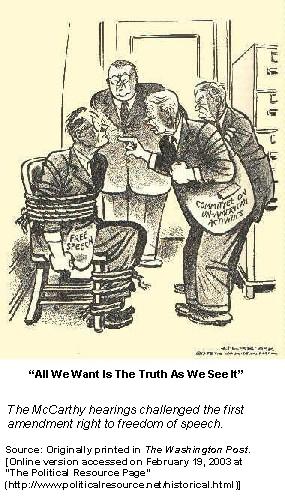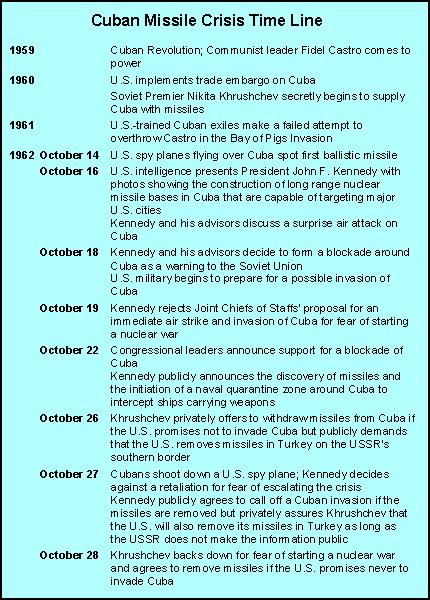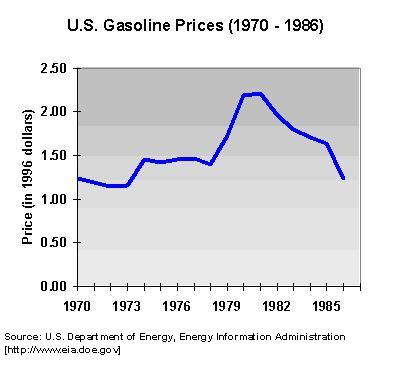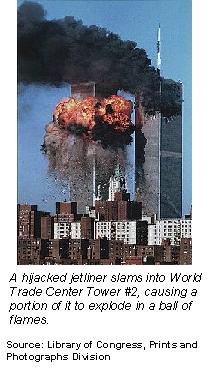POSTWAR AND CONTEMPORARY AMERICA (1945–present)
The Cold War
Before the fighting ended, the Allies had planned for a world peacekeeping organization called the United Nations (UN). The United States joined the UN when it was organized in October of 1945.
The United States came away from World War II as the world's most powerful and richest nation. Americans now took a serious view of their lives and their role in world affairs. No longer isolationist, the United States took an active interest in the war-torn countries of the world. General Douglas MacArthur, who had led the Allies in the Pacific, was stationed in postwar Japan. Under his direction, Japan rebuilt its economy and adopted its first democratic government.
The United States also gave Western Europe the money it needed to rebuild. It hoped to ward off another postwar depression like that which followed World War I. It also hoped that strong economies in Western Europe would help stop the spread of communist governments. Within three years after the end of the war, the Soviets had set up communist governments in the countries of Eastern Europe.
Fears over the spread of communism heightened in 1949 when China adopted a communist government. A year later, communist North Korean armies invaded South Korea with the goal of setting up a communist government there. UN forces, including the U.S. armies, fought for four years to drive back the communists.
 Closer to home, the communist threat produced fears and suspicion among the American people. During the early 1950s, Senator Joseph McCarthy charged that there were communists in the U.S. government. For a time, he conducted public hearings in which he accused and questioned army leaders. Television, which by then appeared in many homes, carried the hearings. McCarthy never found any communists, but he fed the fears of the public and damaged the lives of many Americans.
Closer to home, the communist threat produced fears and suspicion among the American people. During the early 1950s, Senator Joseph McCarthy charged that there were communists in the U.S. government. For a time, he conducted public hearings in which he accused and questioned army leaders. Television, which by then appeared in many homes, carried the hearings. McCarthy never found any communists, but he fed the fears of the public and damaged the lives of many Americans.
Relations with the Soviet Union were extremely tense throughout the forties and fifties. The United States objected strongly to Soviet control in Eastern Europe. The Soviets accused the United States of trying to control Western Europe through its rebuilding aid. The two nations quarreled over atomic weapons. These and many more disputes between the United States and the Soviet Union developed into the Cold War.
The nation as a whole prospered during this time. People had saved their money during the war and were eager to spend it on new cars, homes, and other new consumer goods. Strong demand for goods drove prices and wages up, but this inflation began to level off near the end of the fifties. With so many cars available, more and more people moved from cities to suburbs. Labor unions benefited from the wage hikes and from better working conditions and insurance programs. Government measures during these years, however, restricted the workers' right to strike.
While men were fighting the war, women had taken many factory and office jobs. Many continued working outside their homes after the men returned. Their job opportunities, however, were limited compared with those open to men. President Truman upheld the goals of the New Deal under his own "Fair Deal" programs. He tried to correct abuses of African Americans' people's voting rights in the South and to reduce discrimination against African Americans in all areas of the country. None of his proposals received the support of Congress. The Supreme Court, however, in 1954 upheld the right of African American students to attend white schools. This encouraged African Americans and other minorities to press forward with demands for civil rights.
Back to Top
Vietnam and Civil Rights
Near the end of the 1950s Americans were stunned when the Soviet Union sent the first Earth satellite, Sputnik, into space. Determined not to let the Soviets get ahead of them, Americans rushed to build their own satellites. President Kennedy backed ambitious plans for the U.S. space program. He vowed to put an American on the moon within ten years. In 1969 Astronaut Neil Armstrong did walk on the moon as the whole world watched on television. President Kennedy did not live to share this achievement. An assassin's bullet cut him down in November of 1963.
 During his brief years in office, Kennedy faced stiff issues in the spread of communism and the cold war. Despite the nation's efforts to prevent it, a communist government led by Fidel Castro assumed power in Cuba, just 90 miles off the country's own coastline. In 1962 the Soviet Union began building missile-launching pads in Cuba. President Kennedy ordered the Soviets to remove the missiles. Rather than face possible nuclear war with the United States, the Soviet Union complied with Kennedy's order. This cold war crisis was a tense moment for the whole world.
During his brief years in office, Kennedy faced stiff issues in the spread of communism and the cold war. Despite the nation's efforts to prevent it, a communist government led by Fidel Castro assumed power in Cuba, just 90 miles off the country's own coastline. In 1962 the Soviet Union began building missile-launching pads in Cuba. President Kennedy ordered the Soviets to remove the missiles. Rather than face possible nuclear war with the United States, the Soviet Union complied with Kennedy's order. This cold war crisis was a tense moment for the whole world.
Communism also had spread in Southeast Asia, namely in the country of North Vietnam, during the 1950s. Under President Eisenhower, the U.S. government sent money and advisers to South Vietnam to help it stop communists from the north. The aid continued under Kennedy's administration and under President Lyndon B. Johnson after Kennedy's death. Many Americans objected because they feared another foreign war. Yet others feared the spread of world communism even more. By the middle of the sixties, the United States was sending warplanes and Marines to South Vietnam.
The Vietnam War under Johnson's administration dragged on with little progress toward stopping the North Vietnamese. Criticism of U.S. involvement grew into protests in streets and on college campuses. The war was dividing the nation.
President Johnson believed strongly in civil rights for African Americans and social benefits for the poor. Under his leadership, Congress outlawed discrimination against African Americans, women, and other minorities in the workforce with the Civil Rights Act of 1964. The Voting Rights Act of 1965 helped southern African Americans exercise the voting rights they had been given 100 years earlier. Johnson also succeeded in getting federal aid for schools and health benefits for the poor and elderly under the new Medicare plan. The Vietnam War, however, interfered with Johnson's plans for a "Great Society." Despite their gains in civil rights, African Americans were still segregated, or held apart from homes in white neighborhoods. Their job opportunities were still limited.
Shortly before the presidential election of 1968, Johnson announced publicly that he would not seek another term. Republican Richard M. Nixon won the election by a narrow victory. He promised to end the Vietnam War, reunite a divided nation, and stop violence and crime in the streets.
Back to Top
The Energy Crisis and Reaganomics
The Vietnam War and protests against it dragged on four more years after Nixon's election People were shocked when National Guardsmen shot and killed four students in a demonstration at Ohio's Kent State University in 1970. Finally in 1973, President Nixon withdrew the last of the U.S. troops from Vietnam. U.S. soldiers came home, but painful memories and questions about the nation's involvement in the conflict continued to trouble Americans.
President Nixon greatly improved U.S. relations with communist powers. He personally visited China. The friendly relations he began with the Chinese have grown since. Nixon also eased the cold war with the Soviet Union. He formed a policy stating that both nations could exist on peaceful terms.
Partly because of the expense of the Vietnam War, prices began to soar during the late sixties and early seventies. Nixon's efforts to curb inflation were largely unsuccessful. After his reelection in 1972, Nixon and his staff were accused of crimes during the election campaign. The scandal that followed was known as the Watergate affair. It became so heated that Nixon resigned as president in 1974. Vice President Gerald Ford succeeded him.
 By the mid-seventies, inflation, combined with energy shortages, reached a crisis level in the United States. Many oil-producing nations had formed an organization called OPEC and raised the price of oil drastically. Since the United States depended on oil imported from these countries, Americans had to pay the high prices for oil.
By the mid-seventies, inflation, combined with energy shortages, reached a crisis level in the United States. Many oil-producing nations had formed an organization called OPEC and raised the price of oil drastically. Since the United States depended on oil imported from these countries, Americans had to pay the high prices for oil.
Industry, too, paid the high prices for oil. Prices for other goods began to rage out of control. Businesses cut expenses by laying off workers. Unemployment reached high figures. Democrat Jimmy Carter was president during the late seventies. Inflation and unemployment remained high during his four years in office. Many Americans felt dissatisfied with his efforts to help the economy. They were also disturbed and angry when he was unable to free American diplomats taken hostage in Iran.
Republican Ronald Reagan defeated Jimmy Carter in the 1980 election. Reagan promised to turn inflation and unemployment around. He believed that the way to do this was by lowering taxes, reducing government spending, and decreasing government controls on big business. Reagan also promised to strengthen the nation's military defenses and build respect abroad.
Building military defenses was costly. The government borrowed money to pay for defense spending. Reagan submitted the first trillion-dollar federal budget to Congress. Congress and the president both looked for ways to curb the rising debts. They also studied the nation's place in the world economy. Imports from foreign countries, especially Asia, were entering the country in growing amounts. American businesses and workers often struggled to compete.
President Reagan took a strong stand against the spread of Communism. He aided anti-Communist forces in Central American nations. He also spent much defense money on nuclear arms. The United States and the Soviet Union had tried unsuccessfully since the end of World War II to agree on limiting nuclear weapons in their countries. Reagan maintained that strong nuclear defenses would help the United States force agreements on the Soviet Union. The collapse of the Soviet Union in 1991, however, ended the Cold War and left the United States as the one remaining world superpower.
Back to Top
Into the New Millennium
With the collapse of the Soviet Union, the United States was able to focus its attention on new problems brewing in the Middle East, Africa, and Central America. In 1990 Republican President George Bush sent U.S. marines to invade Panama. Its president was arrested and returned to the U.S. for trial on drug charges. In 1990, when Iraq invaded oil-rich Kuwait, the U.S. and other UN members formed a multinational coalition to drive Iraq out. Two years later, U.S. forces were sent to the African nation of Somalia to end civil unrest and help relief agencies deliver food to the masses of starving people in that country.
 As Bush's first term drew to a close, Americans became increasingly concerned about the growing federal budget deficit. The United States economy became the main topic of debate in the 1992 presidential election. Ready for a change in economic policy, U.S. citizens elected Democrat Bill Clinton, ending the Reagan-Bush Era in the White House. Clinton suggested spending cuts and tax increases to reduce the debt. He was able to submit a balanced budget to Congress for the first time in 24 years. During his first six years in office, the economy grew at an extraordinary rate.
As Bush's first term drew to a close, Americans became increasingly concerned about the growing federal budget deficit. The United States economy became the main topic of debate in the 1992 presidential election. Ready for a change in economic policy, U.S. citizens elected Democrat Bill Clinton, ending the Reagan-Bush Era in the White House. Clinton suggested spending cuts and tax increases to reduce the debt. He was able to submit a balanced budget to Congress for the first time in 24 years. During his first six years in office, the economy grew at an extraordinary rate.
With its economy booming once again, the United States turned back to global issues. Throughout the 1990s, the United States worked with other nations to reduce the danger from nuclear, chemical, and biological weapons. In 1996, President Clinton signed a worldwide Comprehensive Test Ban Treaty. The next year, the Senate ratified an international agreement to ban chemical weapons.
The growth of terrorism both at home and abroad, however, presented a new threat to security in the United States. In 1993 terrorists bombed part of the World Trade Center in New York City. In 1995 U.S. militants bombed the Alfred P. Murrah Federal Building in Oklahoma City. In 1998 bombs tore through the American embassies in two African countries, Kenya and Tanzania. Finally, on September 11, 2001, hijacked jetliners crashed into the twin towers of the World Trade Center in New York and the Pentagon in Washington, D.C. This act was the greatest act of terrorism ever committed on American soil, and it prompted the United States to take action. Most of the term of current president George W. Bush has been dedicated to the United States's War on Terrorism.
Back to Top
 During his brief years in office, Kennedy faced stiff issues in the spread of communism and the cold war. Despite the nation's efforts to prevent it, a communist government led by Fidel Castro assumed power in Cuba, just 90 miles off the country's own coastline. In 1962 the Soviet Union began building missile-launching pads in Cuba. President Kennedy ordered the Soviets to remove the missiles. Rather than face possible nuclear war with the United States, the Soviet Union complied with Kennedy's order. This cold war crisis was a tense moment for the whole world.
During his brief years in office, Kennedy faced stiff issues in the spread of communism and the cold war. Despite the nation's efforts to prevent it, a communist government led by Fidel Castro assumed power in Cuba, just 90 miles off the country's own coastline. In 1962 the Soviet Union began building missile-launching pads in Cuba. President Kennedy ordered the Soviets to remove the missiles. Rather than face possible nuclear war with the United States, the Soviet Union complied with Kennedy's order. This cold war crisis was a tense moment for the whole world. Closer to home, the communist threat produced fears and suspicion among the American people. During the early 1950s, Senator Joseph McCarthy charged that there were communists in the U.S. government. For a time, he conducted public hearings in which he accused and questioned army leaders. Television, which by then appeared in many homes, carried the hearings. McCarthy never found any communists, but he fed the fears of the public and damaged the lives of many Americans.
Closer to home, the communist threat produced fears and suspicion among the American people. During the early 1950s, Senator Joseph McCarthy charged that there were communists in the U.S. government. For a time, he conducted public hearings in which he accused and questioned army leaders. Television, which by then appeared in many homes, carried the hearings. McCarthy never found any communists, but he fed the fears of the public and damaged the lives of many Americans.
 By the mid-seventies, inflation, combined with energy shortages, reached a crisis level in the United States. Many oil-producing nations had formed an organization called OPEC and raised the price of oil drastically. Since the United States depended on oil imported from these countries, Americans had to pay the high prices for oil.
By the mid-seventies, inflation, combined with energy shortages, reached a crisis level in the United States. Many oil-producing nations had formed an organization called OPEC and raised the price of oil drastically. Since the United States depended on oil imported from these countries, Americans had to pay the high prices for oil. As Bush's first term drew to a close, Americans became increasingly concerned about the growing federal budget deficit. The United States economy became the main topic of debate in the 1992 presidential election. Ready for a change in economic policy, U.S. citizens elected Democrat Bill Clinton, ending the Reagan-Bush Era in the White House. Clinton suggested spending cuts and tax increases to reduce the debt. He was able to submit a balanced budget to Congress for the first time in 24 years. During his first six years in office, the economy grew at an extraordinary rate.
As Bush's first term drew to a close, Americans became increasingly concerned about the growing federal budget deficit. The United States economy became the main topic of debate in the 1992 presidential election. Ready for a change in economic policy, U.S. citizens elected Democrat Bill Clinton, ending the Reagan-Bush Era in the White House. Clinton suggested spending cuts and tax increases to reduce the debt. He was able to submit a balanced budget to Congress for the first time in 24 years. During his first six years in office, the economy grew at an extraordinary rate.